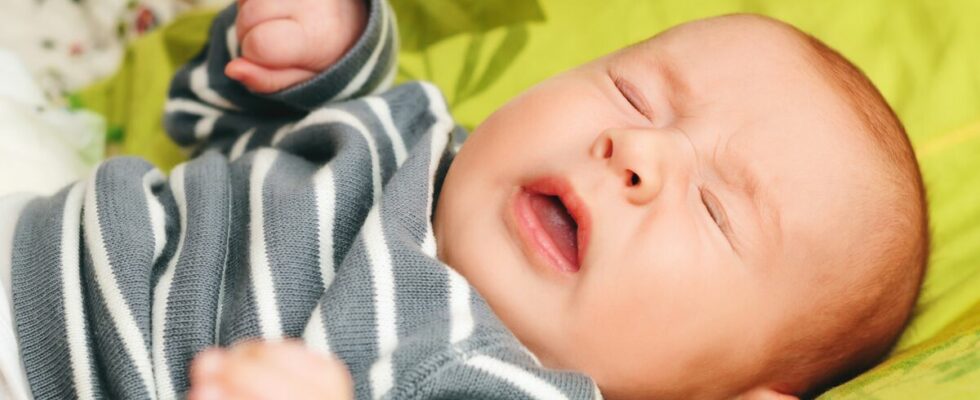It is a disease that can become serious in certain people such as pregnant women, the elderly, but also infants under six months: whooping cough. If this highly contagious respiratory disease seems straight from another time, different countries, such as the United Kingdom and the United States, are recording an increase in the number of suspected cases in some of their regions, as revealed The Parisian.
According to data from the UK Health Security Agency (UKHSA), there have been 716 suspected cases of whooping cough in England and Wales compared to 217 in the same period last year and 213 in the same period of 2021. But what about in France?
Whooping cough: cases in “slight increase” in France
In France, the whooping cough situation is monitored by the Renacoq network, which has 42 pediatric hospital services since 1996. As explained by Santé Publique France, “the disease remains present even if the number of reported cases was low in 2020 and 2021 during the Covid-19 pandemic”. Nearby ParisianChristèle Gras-Le Guen, former president of the French Society of Pediatrics, believes that we would be on a “a slight increase, but not on an explosion”.
Indeed, according to figures relayed by the daily, the positivity rate for bacteria causing whooping cough was 5% before the pandemic. After “falling” during the pandemic, it is now 3%. But what worries specialists is the level of contagiousness of the disease. The disease is transmitted when a bacteria called Bordetella pertussis causes infection of the lungs and respiratory tract. Indeed, as Carla Rodrigues, of the Pasteur Institute with the Parisian, “an infected person can contaminate fifteen on average”.
How is whooping cough transmitted?
On its website, Health Insurance specifies that “this contamination occurs through the air through contact with the sick subject through droplets coming from the nose or mouth during coughing”. Contagiousness is at its highest level during first week of cough. “It lasts three weeks in the absence of treatment, but only five days after the start of effective antibiotic therapy.”
Nearby ParisianCarla Rodriogues believes that there could be an increase in cases this year. “When we see what is happening in Europe (Denmark, Croatia, Belgium, etc.), there is no reason why it should not continue to increase in France”. In France, five epidemic peaks have occurred since the introduction of the vaccine: in 1997, 2000, 2005, 2009, and the peak of 2012-2013, with a fatality rate between 1% and 3%. As the Montpellier University Hospital reminds us, “analysis of health records among hospitalized infants showed that more than 70% to 80% of them had not received any dose of the vaccine against 0% to 2% who had received the 3 doses”.
What are the symptoms of whooping cough?
As Health Insurance specifies, after contamination, “The incubation period, without any symptoms, can be from seven days to three weeks. Generally, it is around ten days.” Then, symptoms appear as the disease progresses. It begins with a runny nose, lasting one to two weeks. Then, a cough appears. Initially “moderate”, it gives way to Cough.
These are characterized by:
- sudden and violent coughs,
- a puffy, red or bluish face,
- a bursting of the small vessels located around the eyes,
- vomiting, especially after bouts,
- after coughing, deep breathing accompanied by the emission of a high-pitched sound similar to the crowing of a rooster,
- clear, thick sputum.
Whooping cough: how to protect yourself from the disease?
To limit the transmission of the disease, health authorities emphasize the importance of vaccination, compulsory for infants since 2018. “The best prevention remains vaccination, which can be carried out at any age”, underlines Health Insurance, which specifies that it is “particularly recommended before pregnancy, and for people who are fragile or exposed to whooping cough”.
According to the Oxford Vaccine Group, a vaccine research group, before the vaccine was introduced to infants, “the average number of suspected cases in England and Wales exceeded 100,000 each year” leading to more than 2,000 deaths. In 1972, when more than 80% of children were vaccinated, 2,069 cases were suspected and two were recorded.
If you have been in direct contact with a person diagnosed with whooping cough, antibiotic treatment is prescribed. This last “must be administered as soon as possible, a maximum of three weeks after contact with a contagious patient”.
Sources:
- Whooping cough: towards an increase in cases of “100-day cough” in France? – Le Parisien (01/22/2024)
- UK Health Security Agency (UKHSA) – Pertussis: guidance, data and analysis
- Whooping Cough – Health Insurance
- Pertussis – Montpellier University Hospital
- Pertussis (Whooping Cough) – University Of Oxford
